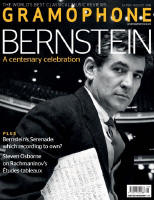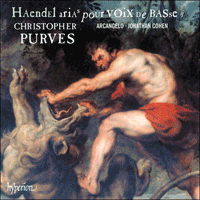Texte paru dans: / Appeared in: |
|
 |
Outil de traduction (Très approximatif) |
|
Reviewer:
Richard Wigmore There may not be as many showstoppers here as on Christopher Purves’s first volume of ‘Handel’s Finest Arias for Base Voice’ (1/13). But this superb followup makes you wonder anew at the composer’s inventive variety in writing for these assorted kings, tyrants and patriarchs. As on his earlier album, Purves’s choice spans Handel’s whole career, from the Italian cantata Nell’africane selve, with its freakishly wide range, to the sympathetic fathers Gobrias and Caleb in Belshazzar and Joshua. Along the way we have, inter alia, a suavely insinuating love song from the saracen king Argante in Rinaldo (a rare Handel opera where a bass gets his girl), arias for the morally ambivalent King Cosroe in Siroe and two moving solos for the treacherous, ultimately despairing Haman in Esther. Purves even slips in a tripping galant aria with bassoon obbligato by Handel’s London rival Porpora, sung by the deep bass Montagnana in the pasticcio Catone. Purves is surely unique among today’s Anglophone singers in fusing an easily produced high baritone, by turns mellifluous and incisive, with a clean, resonant bass register. Like Montagnana, he is specially adept at negotiating what an 18th-century commentator termed ‘distant intervals’. The very look of Nell’africane selve suggests grotesquerie, with shades of the cyclops in Handel’s Neapolitan serenata Aci, Galatea e Polifemo (cantata and serenata were probably written for the same singer). Moving smoothly between registers, Purves manages the improbable plunges and two and a half-octave range with lyrical grace, culminating in the amorous entreaty of the final aria. Here and elsewhere, characterisation is always apt and specific, yet never at the expense of beauty of tone and firmness of line. He brings an agonised intensity to Cosroe’s ‘Gelido in ogni veno’ (belatedly conscience-stricken after ordering his son’s murder) and sings Haman’s entreaty to Esther ‘Turn not, O queen’ with a blanched, traumatised tone, gently cushioned by the Arcangelo strings. Amid so much introspection and soulsearching, straightforward Handelian vigour is represented by sturdy arias from Athalia and Joshua, and strutting ‘rage’ arias from Tolomeo and Siroe – a speciality of the high bass Giuseppe Maria Boschi. Purves provides athleticism and Boschi-like venom aplenty but never merely blusters. Yet it is the slower numbers that tend to linger in the imagination, not least Purves’s hushed tenderness in Gobrias’s lament for his son and Caleb’s sublime vision of a tranquil old age, matched by warmly rounded strings. Ever alive to texture and subtleties of colour, Arcangelo on their own give a fresh, spirited account of one of the Op 3 Concerti grossi, with delightfully perky oboe contributions and witty variations of scoring in the final minuet. David Vickers’s informative essay, placing each item crisply in context, sets the seal on a Handelian winner. |
|




